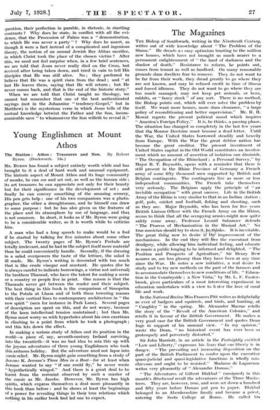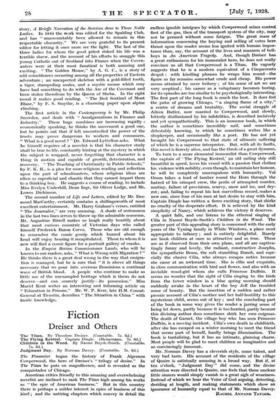The Magazines
THE Bishop of Southwark, writing in the Nineteenth Century, writes out of wide knowledge about " The Problem of the
Slums." He dreads aa easy optimism trusting to the million new houses, which have not brought us much nearer to a permanent enlightenment of " the land of darkness and the shadow of death." Resistance to reform, he points out, comes from tenant as well as landlord. On many reasonable grounds slum dwellers fear to remove. They do not want to be far from their work, they dread greatly to go where they are not known, and may be refused credit in time of illness and forced idleness. They do not want to go where they are too much managed, may not keep pet animals, or hens, rabbits, or " fancy stock " of any sort. There is no method, the Bishop points out, which will ever solve the problem by itself. We want more houses, more slum clearance, " a large policy of reconditioning and better supervision." Mr. R. B. Mowat regrets the present political mood which inspires
" America's Foreign Policy." It is, he thinks, a passing phase. The situation has changed so completely in the last few years that the Monroe Doctrine must become a dead letter. Until the War, the United States borrowed steadily and heavily from Europe. With the War the great debtor nation has become the great creditor. The present investment of United States capital in the Old World constitutes an involve. ment which no amount of assertion of isolation can diminish. " The Occupation of the Rhineland ; a Personal Survey," by Major B. T. Reynolds, opens with a reminder that there is still present in the Rhine Province of Germany a French army of some fifty thousand men supported by British and Belgian contingents. The contingents live as more or less independent communities. The French take themselves very seriously. The Belgians apply the principle of " an invisible occupation " with great success. Life in the British Army of the Rhine is very similar to that in an Indian station ; golf, polo, cricket and football, fishing and shooting, such as they are. Major Reynolds, who has been for five years British Liaison Officer with the French Army on the Rhine, seems to think that all the occupying armies might now quite safely come away. Professor Leonid Sabaneev defends " The Process. of Mechanisation in the Musical Art." No true musician should try to stem it,,Whinks. It is inevitable. The great thing now to desire II the improvement of the mechanisms. In the end they ;ill- Hee the executant from drudgery, while allowing. him -individual feeling, and educate in music a public longing to be informed and delighted. " The Position and Prospects of Agriculture," Sir Henry Rew assures us, are less gloomy than they have been at any time since the War. He notes: a- new initiative, a real desire to study and to try new .methods on the part of the farmers and to accommodate themselves to new conditions of life. " Educa- tion in the Countryside ; a New Vista," by Mr. L. F. Easter- brook, gives particulars of a most interesting experiment in education undertaken with a view to fc ster the love of rural life and work.
In the National Review Miss Frances Pitt writes as delightfully as ever of badgers and squirrels, and birds, and hunting, at " Caughley " in the spring. Mr. Alexander Macrae retells the story of the " Revolt of the American Colonies," and retells it in favour of the British Government. He makes a very good case for the British Government and quotes Dean Inge in support of his unusual view. " In my opinion," wrote the Dean, " no historical event has ever been so grotesquely and perversely distorted."
Sir John Marriott, in an article in the Fortnightly entitled " Law and Liberty," expresses his fears that our liberty is in danger. " The prevailing and increasing disposition on the pait of the British Parliament to confer upon the executive quasi-judicial and quasi-legislative functions is wholly mis- chievous and ought to be resisted." Madame de Lagarenne writes very pleasantly of " Alexandre Dumas."
" The Adventures of Gilbert Blakhal " (unsigned) in this month's Blackwood recall the adventures of the Three Muske- teers. They are, however, true, and were set down a hundred and fifty years before Dumas put pen to paper. Blakhal belonged to an Aberdeenshire family and became a priest, entering the Scots College at Rome. He called his story, A Brieffe Narration of the Services done to Three Noble Ladies. In 1844 the work was edited for the Spalding Club,
and has " unaccountably been allowed to remain in this respectable obscurity." We are very grateful to its present editor for letting it once more see the light. The last of the three ladies for whom the good priest risked his life was a :terrible shrew, and the account of his efforts to smuggle this young Catholic out of Scotland into France when the Coven- anters were at their most fanatical is both amusing and exciting. " The Golden Mouse," by A. G. C., is a story of odd coincidences occurring among all the properties of Eastern adventure ; an unexpected skeleton with a gold-filled tooth, a tiger, stampeding mules, and a mystic mouse which may have had something to do with the Arc of the Covenant and been stolen therefrom by the Queen of Sheba. In the right -mood it makes good reading. " The Red Sentinel of Mont Blanc," by F. S. Smythe, is a charming paper upon alpine climbing.
The first article in the Contemporary is by Mr. Philip Snowden, and deals with " Amalgamations in Finance and -Industry." These huge combines are increasing rapidly : economically speaking, he thinks the movement a good one, but he points out that if left uncontrolled the power of the trusts may prove dangerous to workers and consumers. " What is a good novel ? " Dr. Edward Lyttelton asks. What he himself requires of a novelist is that his character study shall be true to life, constantly hinting at the mystery in which the subject is wrapped, never forgetting that character is a thing in motion and capable of growth, deterioration, and recovery. " The Teaching of Christianity in Public Schools," by F. K. R., is a plea for more religious reading and reflection upon the part of schoolmasters, whose religious ideas are often so superficial and chaotic that they cannot impart them to a thinking boy. He suggests a course of reading, to include Miss Evelyn Underhill, Dean Inge, Sir Oliver Lodge, and Mr. Lowes Dickinson.
The second number of Life and Letters, edited by Mr. Des- mond MacCarthy, certainly contains a shillingsworth of most excellent entertainment. Mr. Harry Graham's verses, entitled " The Journalist," are very amusing. A shade of seriousness in the last two lines serves to throw up the admirable nonsense. Mr. Augustine Birrell makes us laugh really heartily about that most curious eccentric of Victorian days who called himself Frederick Baron Corvo. Those who are old enough to remember the comic gossip which buzzed about his head will enjoy hearing it recapitulated. Those to whom it is new will find a comic figure for a portrait gallery of cranks.
In the Empire Review Commissioner Lamb, who will be known to our readers, asks, " What is Wrong with Migration ? " He thinks there is a great deal wrong in the way that emigra- tion is managed, but he is sure that " it is above all things necessary that we pour into overseas Dominions a continual wave of British blood. A people who continue to make so little use of the unexampled heritage which is theirs do not deserve—and can scarcely justify—its possession." Miss Muriel Kent writes an interesting and informing article on "Education in Prisons." Mr. W. P. Kerr, late H.M. Consul- General at Tienstin, describes " The Situation in China " with inside knowledge.













































 Previous page
Previous page